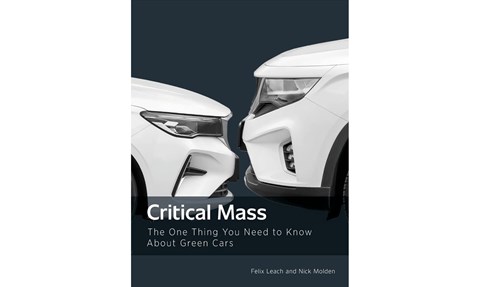► Why not tax cars based on weight?
► Plan to counter ballooning mass
► Emissions experts’ new theory
Ever wondered if bigger, heavier electric cars are really the answer to private transport’s emissions problems? Vehicles of all persuasions – battery, plug-ins, hybrids, petrols and diesels – have become indisputably chunkier in recent years, owing to safety and emissions legislation and the social mores of oneupmanship. A bigger car, especially a modish SUV, is often perceived to be a status symbol.
The weight of a typical family hatchback has doubled in the past 50 years and calls are growing across Europe to stop the automotive obesity crisis. Two automotive analysts in Britain have published a book on the matter – Critical Mass: The One Thing You Need to Know About Green Cars.
Authors Felix Leach and Nick Molden question if the blinkered approach of electrifying everything is the right answer and point out that electric vehicles (EVs) tend to be around 40% heavier than traditional combustion alternatives. Bulkier cars require bigger batteries and more materials to build, use up more road and parking space, and furthermore emit greater emissions from tyre, brake and road wear – countering the benefits of zero tailpipe emissions.

The Molden-Leach Conjecture: a new way to tax cars based on a vehicle’s weight
The book eschews traditional government thinking that focuses purely on carbon dioxide emissions and proposes a new, technology-agnostic solution that instead taxes cars on their mass. It argues that a vehicle’s kerbweight is a smarter way to charge road users, as it creates a virtuous circle that will encourage smaller, lighter cars with less environmental impact.
‘Our exhaustive research has revealed that one easy metric — car weight — gives a surprisingly good estimate of overall pollution, including greenhouse gases, air toxics, noise, safety and infrastructure impacts,’ said Molden. ‘Consumers can therefore use this to choose their next car, without being baffled by data from biased sources.’
How would it work?
The Molden-Leach Conjecture would use the published kerbweight of a vehicle multiplied by the distance driven in a year to measure its environmental impact. The authors suggest it is a fairer and more accurate way to assess road tax and the data required is already captured in European DIN specifications and MOT certification.
In short, the lighter a car and the less it’s driven, the lower the tax burden. The book claims a driver would pay £100 less a year if their car was 150kg lighter than the average or if they drove 1000km (620 miles) below the UK average. ‘No longer will governments have to force a chosen golden technology on everyone. Rather, drivers will be able to freely choose what car to buy and how many miles they drive, but will have to pay the right amount for the environmental damage.’
Molden is the founder and CEO of Emissions Analytics, a company he set up in 2011 to measure real-world emissions of road cars – a topic that fell in the limelight in the wake of the Volkswagen dieselgate emissions scandal of 2016. Leach is an Associate Professor of Engineering Science at the University of Oxford and is a member of the Institution of Mechanical Engineers.
They claim that a move to a weight-assessed taxation system would end the automotive ‘age of auto-besity.’

Will the UK government scrap CO2 car tax in favour of weight calculations?
Sadly, it appears not any time soon. You can read our handy explainer on how car tax works today, but a spokesman for HM Treasury told The Times: ‘We have no plans to reform Vehicle Excise Duty (VED) to be based solely on weight. The shift to electric vehicles is crucial for decarbonising the transport sector and tackling climate change, and will support growth and productivity across the UK.’
Norway has introduced a tax on heavier cars and France started charging a €10 (£8) supplement on petrol and diesel cars for every kilogram they weigh over 1800kg while authorities in Paris and other cities are planning higher parking charges for Chelsea tractors.